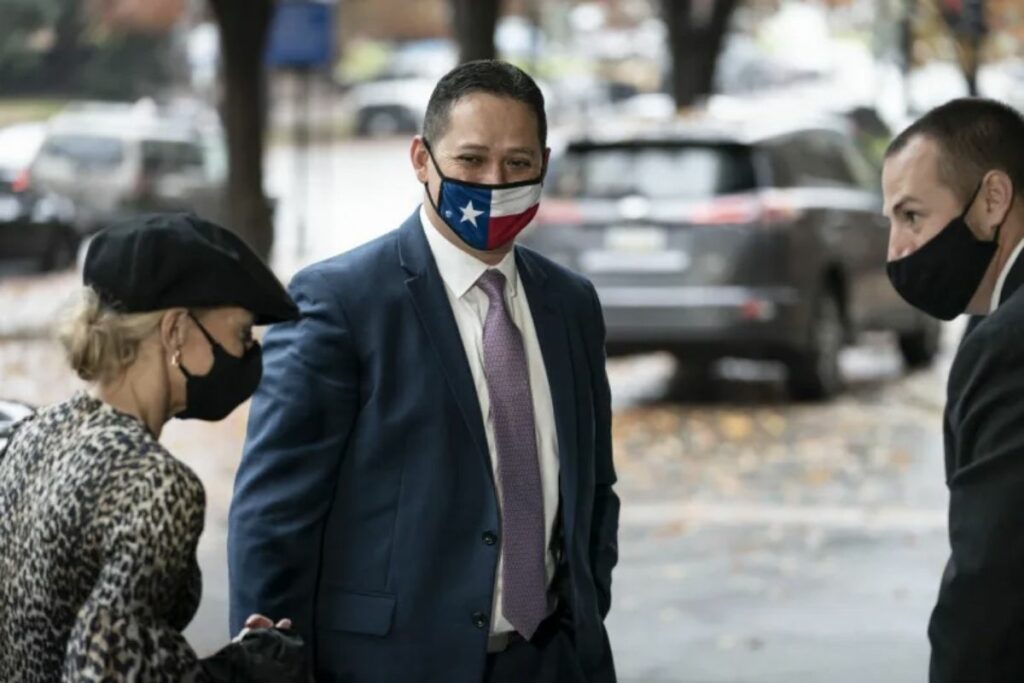As U.S. Customs and Border Protection (CBP) keep on managing a movement flood that has seen the organization experience north of 164,000 individuals in the southwest throughout the course of recent months, neighborhood police are being compelled to get a portion of the leeway.
“The Border Patrol agents and the sheriffs are beyond a breaking point,” Republican Congressman Tony Gonzales, who represents the district, told Newsweek.
Across Texas’ broad 23rd legislative locale, which runs around 800 miles from south of El Paso to north of Laredo, reacting to travelers intruding through farms and catching runners, traveling through towns has become as ordinary a piece of the gig, Gonzales told Newsweek.
The sheer size of the region, and the way that its three essential boundary provinces, Hudspeth, Presidio, and Brewster, are bigger than certain states, makes watching the region a test for both nearby and government specialists. Also in light of the fact that the per capita pay of Texas’ District 23 of simply more than $27,000 falls beneath the U.S normal of nearly $36,000, the region needs assets to react to the continuous flood.
“The other part is they’re very rural, so there’s not a lot of people, to begin with, but there’s a lot of territories to cover,” Gonzales told Newsweek.
Gonzales said that the pressure has prompted a more prominent number of suicides and liquor-related episodes for both Border Patrol specialists and regulatory requirements. More officials have likewise resigned, he said, and positions have become more earnestly to fill.
To address these difficulties, Gonzales has proposed multiplying the subsidizing for a line requirement measure known as Operation Stonegarden, an award program under the Department of Homeland Security (DHS) that permits regulation authorization to support their abilities through financing recently added team members, additional time hours, and hardware.
Under Gonzales’ Border Operations Strengthened by Stonegarden (BOSS) Act, subsidizing would go from $90 million to $180 million for each monetary year until 2025, with $60 million explicitly assigned for the buying of new innovation. The bill would likewise permit cash seized at the southern line to be placed into the award and would require DHS to make provide details regarding how can be further developed CBP employing and maintenance and what innovation is required. The supervisor would likewise assign Mexican Drug Cartels as unfamiliar psychological oppressor associations.
“When I first got elected (in 2020), here I am now representing this huge border district, and I made several trips early on, and when I met with folks, I asked them: ‘If there’s one thing I could do, what would you want me to do?'” Gonzales told Newsweek. “And this is where operation Stonegarden kept coming up over and over again with the local law enforcement.”
Read More: Canada Span Returns After Police Eliminate Last Dissidents
Gonzales said passing this bill is tied in with making answers for the issues that regulation implementation is confronting at present. While he said issues at the line will undoubtedly continue for quite a while, Gonzales considers this action to be something that upholds U.S. interests along bipartisan lines.
Recently, Gonzales held a bipartisan gathering with Border Patrol Chief Raul Ortiz and Capitol legislators, including Pete Aguilar (D-Calif.), Ken Calvert (R-Calif.), Salud Carbajal (D-Calif.), Chuck Fleischmann (R-Tenn.), Carlos Gimenez (R-Fla.), and Susie Lee (D-Nev.). The requirement for further developed innovation to keep up with seriousness with drug cartels, which currently use robots to carry drugs, was a focal point of the gathering. Gonzales considers Stonegarden to be a response to these necessities.
“What this bill does is it puts some money towards the ability to use technology as a way to keep our country safe,” Gonzales told Newsweek.
Newsweek reached U.S. Customs and Border Protection (CBP), the National Border Patrol Council trade guild, and the Hudspeth, Presidio, and Brewster Country Sheriff’s Offices however didn’t get a reaction on schedule for distribution.
Read More: Florida: State’s Covid Observing Framework Passes On Open Ignorant Concerning New Variations

